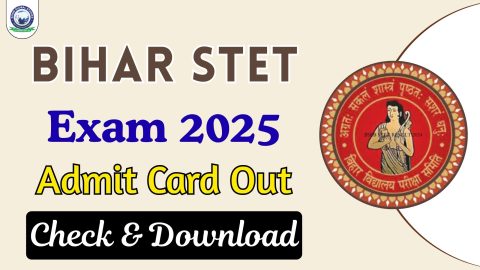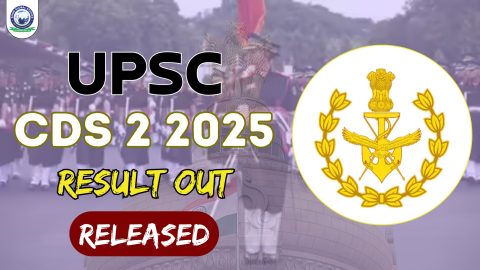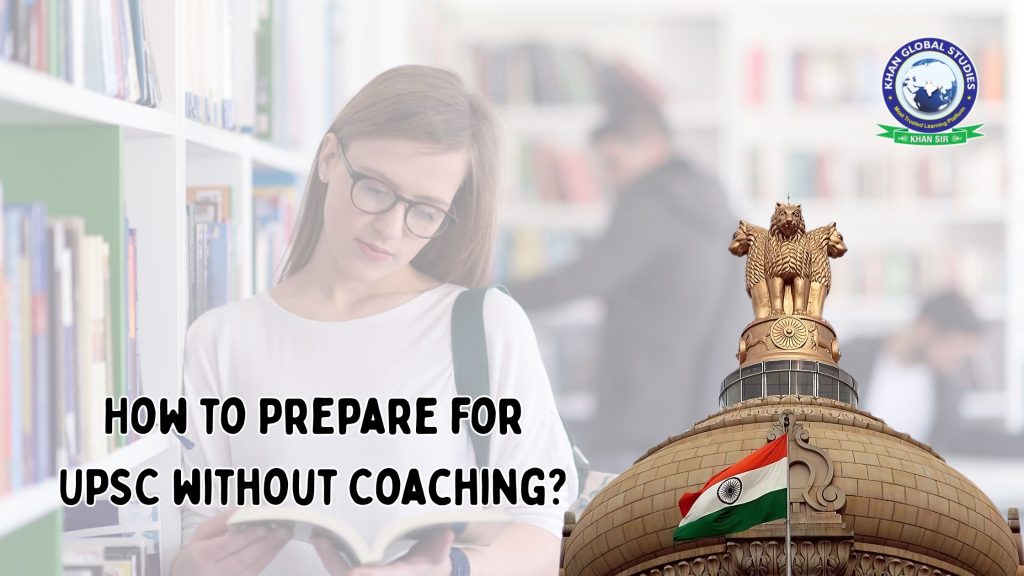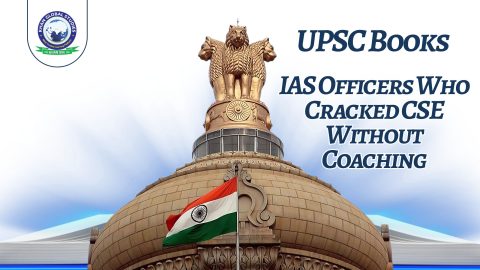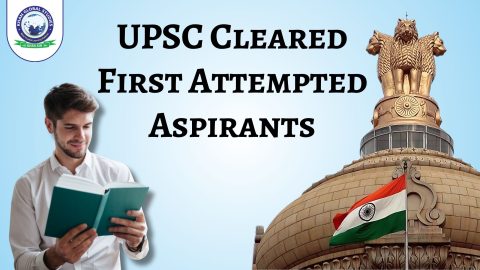Your topic is how to prepare for UPSC without coaching. The dream of becoming an IAS, IPS, or IFS officer is a powerful one. It’s a journey of dedication, hard work, and immense prestige. But for many aspiring civil servants, the first big question is: “Do I need to join an expensive coaching institute?”
For years, the path to cracking the UPSC Civil Services Examination (CSE) seemed to run straight through the doors of a traditional coaching center. But times are changing. Today, with the right strategy and resources, you can absolutely prepare for UPSC without coaching and come out on top.
So, if you’re wondering how to start your UPSC preparation at home, you’ve come to the right place. This guide is your roadmap to success, breaking down the entire process into simple, actionable steps. Let’s dive in!
Is It Really Possible to Crack UPSC Without Coaching?
Let’s tackle the biggest question first. Yes, it is 100% possible to clear the UPSC exam without joining a physical coaching class. Every year, a significant number of successful candidates, including top rankers, are those who relied on self-study.
Here’s why self-study for UPSC is a more viable option now than ever before:
- Discipline Over Dependency: Success in UPSC is about your personal discipline, not your attendance at a coaching center.
- Quality Resources are Accessible: High-quality study material, online lectures, and test series are now available at your fingertips.
- Flexibility is Key: Self-study allows you to create a personalized schedule that fits your learning style and pace, something that is often missing in a one-size-fits-all classroom.
The new formula for success isn’t about choosing between coaching and no coaching. It’s about choosing smart, guided preparation over directionless effort.
The Foundation: Your Step-by-Step UPSC Self-Study Plan
Preparing for UPSC without coaching requires a rock-solid plan. Think of it like building a skyscraper—you need a strong foundation, a detailed blueprint, and consistent work. Here is your blueprint.
Step 1: Understand the UPSC Exam Inside Out
Before you pick up a single book, you must know your battlefield. The UPSC CSE is a three-stage exam:
- Preliminary Exam (Prelims): This is the screening stage with two objective-type papers (MCQs).
- General Studies Paper I: Covers History, Geography, Polity, Economy, Science & Tech, Environment, and Current Affairs. Your score in this paper determines if you qualify for Mains.
- General Studies Paper II (CSAT): This is a qualifying paper (you need to score at least 33%). It tests your comprehension, reasoning, and basic numeracy skills.
- Main Examination (Mains): This is the real test of your knowledge and analytical skills. It consists of nine descriptive papers.
- The marks from seven of these papers are counted for the final merit list. This includes one essay paper, four General Studies papers, and two papers on your chosen optional subject.
- Interview (Personality Test): This is the final stage where a panel assesses your personality, mental alertness, and suitability for a career in the civil services.
Actionable Tip: Download the official UPSC syllabus from the UPSC website. Print it out and stick it on your study table. The syllabus is your North Star throughout your preparation.
Step 2: Build Your Base with NCERTs
NCERT textbooks from Class 6 to 12 are the holy grail for UPSC preparation. Don’t even think about skipping them! They are written in simple language and provide the fundamental concepts needed to understand the more advanced standard books.
- For History, Geography, and Social Science: Start from Class 6.
- For Economy and Polity: Class 9 to 12 is sufficient.
- For Science: Focus on relevant chapters from Class 6 to 10, especially related to biology and environmental science.
Read them at least twice. The first reading should be like reading a story to get a general idea. In the second reading, start making concise notes.
Step 3: Choose Your Standard Books Wisely
After NCERTs, you need to move to standard reference books. The biggest mistake aspirants make during their self-study is hoarding too many books. The key is to limit your resources and revise them multiple times.
Choose one standard book for each subject:
- Indian Polity
- Modern Indian History
- Indian Economy
- Geography
- Art & Culture
Remember, your goal is not to become a PhD in these subjects, but to understand them well enough to answer the questions asked in the exam. Click @ Best Books Resources for UPSC Preparation Without Coaching
Step 4: Master the Art of Newspaper Reading
Current affairs are the backbone of the UPSC exam, linking almost every static subject. You must dedicate 1-1.5 hours daily to reading a good national newspaper.
But how you read it matters more than what you read.
- Connect with the Syllabus: Don’t just read the news. Connect every piece of news to a topic in your GS syllabus. For example, if there’s news about the Supreme Court, link it to your Polity notes on the Judiciary.
- Focus on Issues, Not News: Understand the “why” behind the news. Instead of just knowing about a new government scheme, focus on why it was needed, its features, and its potential challenges.
- Make Brief Notes: Jot down important facts, keywords, and analyses in a dedicated notebook or digital file.
Step 5: Create a Realistic and Disciplined Timetable
When you prepare for UPSC without coaching, your timetable is your boss. It needs to be realistic, sustainable, and balanced.
- Divide Your Day: Break your study time into 2-3 hour slots.
- Mix Subjects: Study a heavy subject like Polity and then switch to a lighter one like Environment to avoid burnout.
- Include Everything: Your schedule should include time for newspaper reading, optional subject preparation, revision, and practice.
- Don’t Forget Breaks: Taking short breaks is crucial for maintaining focus and productivity. Also, ensure you get 7-8 hours of sleep.
A consistent 7-8 hours of focused study every day is far better than studying for 14 hours one day and getting burned out the next.
Step 6: The Holy Trinity: Notes, Revision, and Practice
This is the step that separates successful aspirants from the rest.
- Note Making: Make your own short, crisp, and easy-to-revise notes. This helps in memory retention and is a lifesaver during the last-minute revision before Mains.
- Revision: Revision is non-negotiable. Plan your revision schedule—daily, weekly, and monthly. Without revision, all your hard work will go to waste.
- Practice:
- Previous Year Questions (PYQs): PYQs are a goldmine. They help you understand the pattern and demand of the exam.
- Mock Tests: Regularly taking mock tests for both Prelims and Mains is crucial. It helps you manage time, identify your weak areas, and simulate the real exam environment.
The Khan Global Studies Advantage: Self-Study Supercharged
Preparing for UPSC without traditional coaching doesn’t mean you have to do it all alone. The biggest challenges in self-study are often a lack of guidance, a structured learning path, and a way to clear your doubts.
This is where a trusted online platform can make all the difference. At Khan Global Studies (KGS), we are dedicated to providing a high-quality, structured, and affordable learning experience that complements your self-study journey perfectly.
Think of it as having the best of both worlds: the flexibility of self-study combined with the expert guidance of a top-tier institution.
- Structured Learning: Our UPSC CSE Foundation Courses provide a clear roadmap, covering the entire syllabus from basic to advanced levels, so you never have to wonder “what to study next.”
- Expert Faculty: Learn complex topics in a simple and engaging way from experienced educators who understand the pulse of the UPSC exam.
- Doubt Clearing Sessions: Stuck on a concept? Our dedicated doubt-clearing sessions ensure that no question goes unanswered, a critical feature missing in pure self-study.
- Daily Practice Problems (DPPs) & Test Series: We provide regular practice questions and a comprehensive test series to help you constantly evaluate your performance and improve your scores.
- Flexibility: With live classes and recorded video backups, you can learn at your own pace, anytime, anywhere.
With KGS, you are not just preparing without coaching; you are preparing with a smart, modern, and effective support system.
FAQs – Your UPSC Self-Study Doubts Cleared
Q1: Can I clear UPSC in my first attempt without coaching?
A: Absolutely! Many toppers have done it. Success in the first attempt depends on a clear strategy, consistent hard work, and smart resource management, not on whether you attended coaching. Stick to the plan outlined above, and you have a very strong chance.
Q2: How many hours a day should I study for UPSC at home?
A: There is no magic number. Quality matters more than quantity. A dedicated and focused study of 7-8 hours per day is generally considered sufficient. The key is to be consistent with your schedule every single day.
Q3: How do I stay motivated during my UPSC self-study journey?
A: Staying motivated is a challenge. Keep your “why” in mind—the reason you started this journey. Set small, achievable weekly goals. Reward yourself for meeting them. Follow a few good mentors online, and remember to take breaks to avoid burnout.
Q4: Which optional subject is best for self-study?
A: The best optional subject is the one that you are genuinely interested in. Consider your academic background and the availability of study material. Subjects with a clear, static syllabus like Public Administration, Sociology, or History are often considered good for self-preparation.
Q5: How important are coaching classes for UPSC?
A: Coaching can provide structure and guidance but is not essential. Self-study is equally effective if you are self-motivated and resourceful.
Q6: How do I stay focused during self-study for UPSC?
A: Create a detailed timetable, set daily targets, eliminate distractions, and reward yourself after completing study goals.
Q7: What are the best resources for UPSC preparation without coaching?
A: Start with NCERTs, followed by standard reference books. Use newspapers, government reports, PIB releases, and free online lectures along with test series.
Q8: How many hours of study are required for UPSC without coaching?
A: There’s no fixed number of hours. The focus should be on the quality of study rather than the quantity. On average, 8-10 hours of focused study per day is considered sufficient.
Q9: How to stay updated with current affairs without coaching?
A: Reading newspapers daily is the best way to stay updated with current affairs. You can also refer to monthly current affairs magazines and online resources.
Q10: How Can I Start Preparing for UPSC at Home Without Coaching?
A: Begin with basics: Read NCERTs, understand the syllabus, and create a daily plan. Use interactive apps and modules for structure, learning at your own pace.
11: What Are the Best Books for UPSC Self-Preparation?
A: Go for classics like Indian Polity by Laxmikant, Modern India by Spectrum, and Economic Survey summaries. Supplement with online ethics and essay modules for comprehensive coverage.
Q12: Can Working Professionals Prepare for UPSC Without Coaching?
A: Yes, with flexible schedules. Study evenings or weekends using anytime-access online courses. Prioritize high-yield topics like current affairs.
Final Words on Your Journey
Deciding to prepare for UPSC without coaching is a bold and powerful choice. It is a path of self-reliance, discipline, and immense personal growth. The journey will be challenging, but with the right strategy, unwavering dedication, and a smart support system, your dream of seeing your name in that final PDF is well within reach.
Remember, the goal is not just to study hard but to study smart. Follow the steps, stay consistent, and believe in yourself. Ready to supercharge your self-study and turn your dream into reality? Explore the comprehensive and structured UPSC programs at Khan Global Studies and take the first confident step towards a successful career in the civil services.
